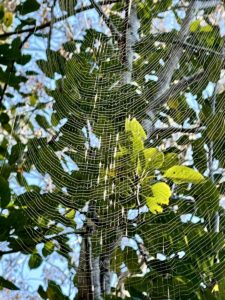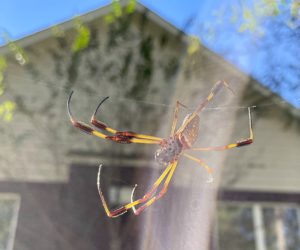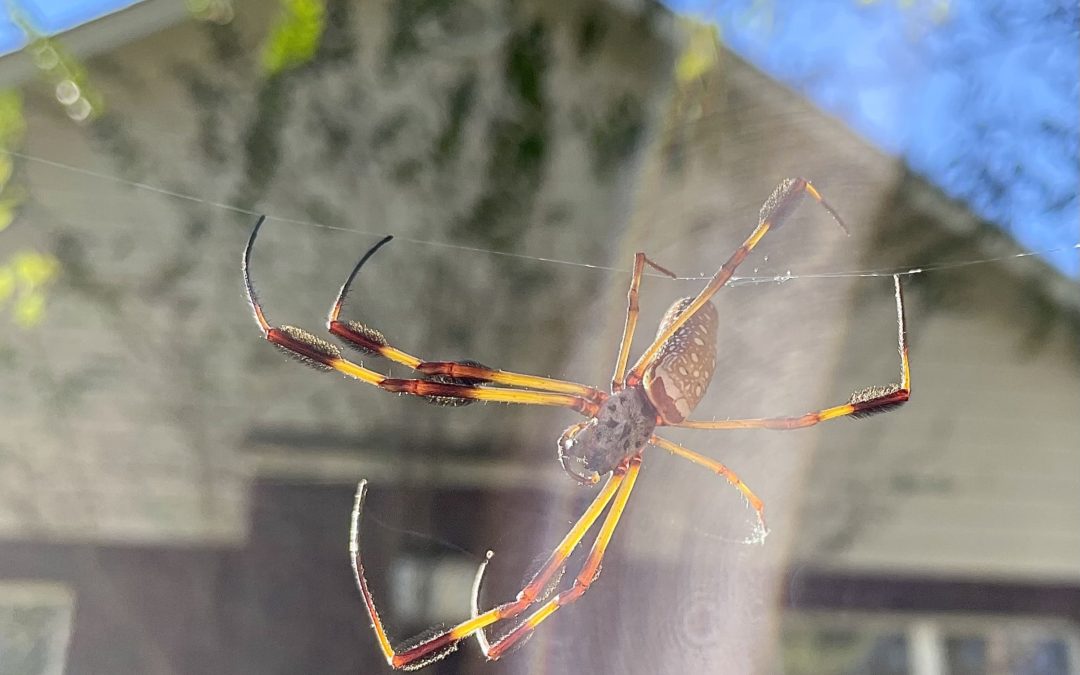
Harriet’s web
I knew as I was falling it would hurt to land. Afterwards, I convinced myself the pain was due to nothing more than a bruised rib until an x-ray revealed a rib fracture with “mild dislocation.” That’s code for major dislocation of my lifestyle for a month or so. To be specific, I was told to stop running for two to four weeks. In the final month of half-marathon training, that’s a devastating loss of mileage. It’s not that I haven’t experienced the disappointment of altered plans before. I’ve cancelled more trips during Maggie’s illness and our Covid-imposed New Normal than I can count. But it sure hurts to come face-to-face with my hard winter lawn and the reality of how little control of my own life and plans I have, all in the same messy tumble.
As my rib discomfort and these uncomfortable thoughts percolate beneath the surface, I’m studying the book of Isaiah using Warren Wiersbe’s guide Be Comforted: Feeling Secure in the Arms of God. I’m not finding any quick reassurance or easy answers to nagging questions. Aren’t His arms best used, if not to keep me from tripping over my own feet or to wave me on to flawlessly orchestrate my own life, to at least help me not suffer so much with the consequences? And with the full shape of crystallized selfishness taking shape in my questions, I see I’ve reduced God’s hands in my life to the function of foam pit or designated driver – there merely to cushion from falls and protect from poor choices.
Judah was in serious need of divine protection from invading forces. Instead of turning to a faithful God for guidance, they made their own plans. I seem to prefer to write my own script, too. Only when I’m forced to see the approaching downfall do I call out to Him. Wiersbe says the message of Isaiah can be summed up in a framed statement he saw on a friend’s desk years ago. Faith is living without scheming. In other words, faith leaves the plans and their consequences in His hands.
I find joy in making lists – sometimes even after the fact – so I can recognize and relive the steps I’ve accomplished. I want to pick and choose the goodbyes I say, the delays I endure, and the races I get to run. Always. Too often I find my security in my ability to plan out my life to the minute and then execute said plan with precision. But then come the falls to stop me long enough to think.
Isaiah, delivering God’s message, urges Judah and me to consider Who is really in charge and offers the surest form of safety. The steadfast of mind You will keep in perfect peace, because he trusts in You. (Isaiah 26:3, NASB). It’s difficult, if not impossible to cling to Him in trust when I’m clinging to self, others, or things which seem nearer, stronger, and more attractive, in the moment, than the Everlasting Rock. And when I make an idol of my own comfort and safety, I lose the ability to see the way that leads me to trust Him.
Toward the end of summer, a banana spider spun her web between our pear and maple trees and spun her way into our hearts. Yes, a spider. We watched Harriet for months, checking on her each morning. We marveled at her survival skills after windstorms. She didn’t mate, lay eggs, and die in autumn as most of her type do, choosing instead a career of web maintenance over family, I suppose. As Christmas approached, I asked Molly if we needed to get her a present. What does one give a self-sufficient spider? Her reply came quickly enough that I knew she, who holds things as fiercely as I, dreaded losing our spider, too. “A terrarium.” Would she be happy in the sunroom? We were invested in her survival, won over by her dogged determination to keep spinning web.

Harriet the Spider
Winter in Mississippi is a fickle thing, but we knew eventually it would arrive and force what her refusal to conform to spider norms had only delayed. We had several close calls with mild freezing weather in December when Harriet became dormant, forcing us to hold our breath until rising temperatures warmed her back to life. But the first real winter storm came right after the new year. Molly found Harriet on the ground beneath her web and scooped her into a red Dixie cup to bring inside. The warm air proved useless in thawing her back to us. We left her in the cup on the counter for days, trying to think of the best place for her final rest and just how to say goodbye. How does one eulogize a spider?
I think I struggled with Harriet’s death and my fall as I always resist saying goodbye to people, cherished dreams, plans, and, apparently, sometimes spiders. But the hardest goodbye for me is the one I need to say to self-sufficiency. Too much of the time, I reduce life to mere survival, a matter of my own efforts to keep my web intact and to keep myself – safe and attached – in its center.
But we were made for more than survival and the starring role in our human webs. If Isaiah is showing me anything it is that God uses the very suffering and consequences of approaching armies and faulty steps to turn me back to dependence on Him. Oswald Chambers reminds us that “God speaks in the language you know best— not through your ears, but through your circumstances.”
As I stare at Harriet’s now-empty web one last time, I’m just fanciful enough to imagine the silk strands have been arranged into her final words. Her message could not have been more plain had she borrowed a trick from E. B. White’s Charlotte and crocheted them for the world to read. Lose control.
And in the letting go we are held. Safe. Not from the goodbyes, or disappointment, or the suffering. But from something far worse. Of never learning that we are meant to hold more than the work of our own hands. We are made to grasp eternity.

Did not know you had fallen but your words are exactly written about me. I fell 6 weeks ago and broke the T- 11 vertebrae
Celeste – I’m so sorry about your fall – much more serious than mine. I hope you are recovering. Thank you for reading!
Wonderful as always❣️
Thank you as always for reading!
What a beautifully written message! The Lord has patiently been trying to teach me this very thing – but I am such a slow learner. Thank you for this wonderful reminder; i needed it.
Suzanne – thank you for reading and commenting. I’m either a slow learner or quick forgetter. I’m thankful for the Lord’s patience, too!
A reminder we can all use and you have the gift of explaining it beautifully (even if you did use a spider 😳)! Thank you for sharing Melissa! ❤️
Crystal – thank you for reading and forgiving me the spider reference. Let’s just say I admire them from a little distance.
Beautifully written from the heart. So hard to let go and trust in God whom we can’t really see, even though we can feel His touch, hear His whispers and see His beautiful work all around us. He is constantly working to give us what we need. Total trust and letting go is hard.
Kathy – thank you for reading and commenting. Yes, it is hard. I’m thankful He keeps reminding me to trust.
As always, a perfect piece that hits home. ❤️
‘Lose control.’
So hard to do. Trust. Faith. The thing is, they’re like us, right. They need exercise and muscles for the next part of the journey. Thank you always for your thought-filled words and ‘blood’ on these pages. gail
Yes – exercise and a little rest in those dormant times. Thank you for reading and sharing.